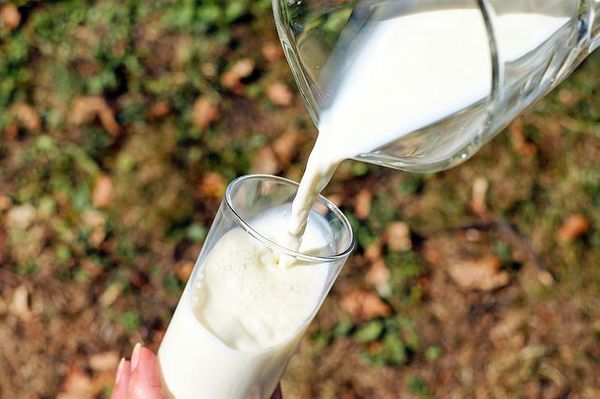Cow milk is a widely consumed and versatile dairy product that has been a staple in human diets for centuries. It is the milk produced by female cows and is an excellent source of essential nutrients, making it an important part of many people’s diets worldwide. Here, let’s explore the health benefits about cow milk, its nutrition, and its side effects.
1. Cow Milk Is Packed With Nutrients
Milk is a rich reservoir of essential vitamins and minerals, particularly those classified as “nutrients of concern” that are frequently lacking in many diets. It contains a notable supply of potassium, vitamin B12, calcium, and vitamin D, which are often deficient in many people’s daily food intake. Additionally, milk is a valuable source of magnesium, zinc, thiamine (vitamin B1), and vitamin A. (Source)
2. Health Benefits of Cow Milk – It is a Good Source of Quality Protein
The protein in milk is a high-quality, complete protein, meaning it contains all the essential amino acids that the human body needs for various functions, such as building and repairing tissues, supporting the immune system, and maintaining overall health.
The primary proteins found in milk are casein and whey, each with its unique characteristics. Casein makes up the majority of the protein content in milk and is known for its slow digestion, providing a sustained release of amino acids to the body. Whey protein, on the other hand, is quickly absorbed and is particularly rich in branched-chain amino acids (BCAAs), which are vital for muscle development and recovery. (Source)
Milk’s protein content not only aids in muscle growth and repair but also helps with feelings of fullness, making it a valuable component in weight management and satiety. Athletes and fitness enthusiasts often incorporate milk into their diets as a post-workout recovery beverage, as it supplies essential amino acids to support muscle recovery and growth. (Source) (Source)

3. Cow Milk Benefits the Bone Health
For generations, the consumption of milk has been associated with the promotion of robust bone health. This connection is rooted in the milk’s unique blend of essential minerals, such as calcium, phosphorus, potassium, protein, and vitamin K2, all of which play pivotal roles in maintaining the strength and vitality of bones.
The human body stores approximately 99% of its calcium within the bones and teeth. In addition to calcium, milk also provides vital nutrients like vitamin D, vitamin K, phosphorus, magnesium, and other co-factors necessary for the efficient absorption and utilization of calcium. These comprehensive components found in milk support the preservation of strong and healthy bones.
Incorporating milk and dairy products into your diet may serve as a protective measure against bone-related conditions, including the debilitating effects of osteoporosis.
4. Cow Milk Helps Prevent Weight Gain
Several studies have indicated a reduced risk of obesity associated with milk consumption. Intriguingly, this benefit has primarily been associated with the consumption of whole milk. A study involving 145 Latino three-year-olds found that greater intake of milk fat was linked to a decreased likelihood of childhood obesity. This phenomenon may be attributed to various components present in milk that can facilitate weight loss and prevent weight gain. Notably, a diet rich in protein can promote prolonged feelings of fullness, potentially aiding in the prevention of overeating. (Source)
Nutrition And Nutritional Value Of Cow Milk

According to the National Nutrient Database of the United States Department of Agriculture, 100g of Cow Milk has the following nutrients (USDA). (Source)
- Water 88.1 g
- Energy 60 kcal
- Protein 3.28 g
- Total lipid (fat) 3.2 g
- Carbohydrate, by difference 4.67 g
- Sugars, total including NLEA 4.81 g
- Calcium, Ca 123 mg
- Magnesium, Mg 12 mg
- Phosphorus, P 101 mg
- Potassium, K 150 mg
- Sodium, Na 38 mg
- Choline, 17.8 mg
- Vitamin A, 32 µg
- Vitamin D, 1.1 µg
- Retinol, 31 µg
- Carotene (beta), 7 µg
Also Read: All About Buffalo Milk – Health Benefits, Healthy Facts, Nutrition and Nutritional Value
Healthy Facts of Cow Milk
Milk fat has the potential to boost the levels of beneficial HDL cholesterol. Maintaining healthy levels of HDL cholesterol can serve as a protective barrier against cardiovascular issues such as heart disease and strokes (Source)
Milk also serves as a notable source of potassium, a vital element in regulating blood pressure. Milk is a good source of potassium as well. Furthermore, milk derived from cows raised in pastures or on a diet of grass tends to be richer in conjugated linoleic acid and omega-3 fatty acids. These particular fats play a role in promoting the well-being of blood vessels and heart health.
Should You Drink Cow Milk? Does it Have Side Effects?
Lactose intolerance is a common condition where the body lacks sufficient lactase enzyme to digest lactose, the sugar found in milk. Symptoms may include gas, bloating, diarrhea, and stomach cramps after consuming milk or dairy products.
For everyday healthcare, know the healthy facts and nutrition of dairy products on Health Views Online where we share nutrition, health benefits, facts, precautions as well as side effects of various diary foods.





